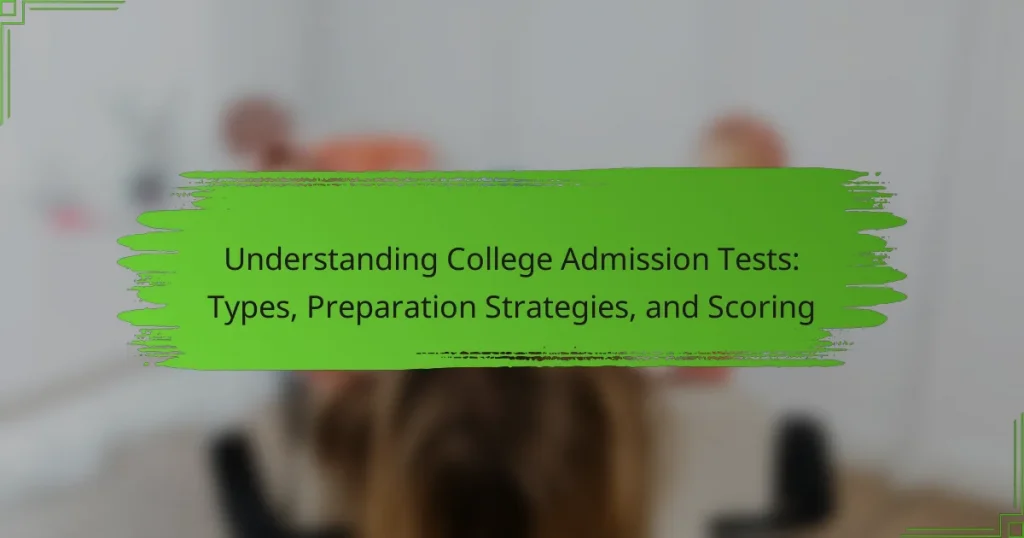
What are College Admission Tests?
College admission tests are standardized assessments used to evaluate a student’s readiness for college. These tests measure skills in areas such as mathematics, reading, and writing. Common examples include the SAT and ACT. Colleges use scores from these tests as part of their admissions process. High scores can enhance a student’s application. According to the College Board, over 2.2 million students took the SAT in 2021. This indicates the significance of these tests in college admissions.
Why are College Admission Tests important for students?
College admission tests are important for students because they provide a standardized measure of academic readiness. These tests help colleges assess a student’s potential for success in higher education. They often play a significant role in the admissions process. For example, standardized scores can influence scholarship opportunities and acceptance rates. Research indicates that students who perform well on these tests tend to have better college outcomes. According to a study by the College Board, students with higher SAT scores are more likely to graduate on time. Additionally, these tests can help identify areas where students may need improvement. Overall, college admission tests serve as a critical tool for both students and institutions in evaluating academic capabilities.
How do College Admission Tests influence college admissions?
College admission tests significantly influence college admissions by providing standardized metrics for evaluating applicants. These tests, such as the SAT and ACT, assess students’ academic readiness for college. Colleges use test scores to compare applicants from diverse educational backgrounds. Higher scores often enhance an applicant’s chances of admission. Research shows that test scores correlate with first-year college performance. For instance, a study by the College Board found that students with higher SAT scores tend to achieve better GPAs in college. Additionally, some colleges have adopted test-optional policies, indicating that while tests influence admissions, they are not the sole factor. Overall, college admission tests serve as a critical component in the holistic review process of applicants.
What role do College Admission Tests play in academic readiness?
College admission tests assess a student’s academic readiness for higher education. They measure skills in critical areas such as reading, writing, and mathematics. These tests provide a standardized metric for comparing student performance. Colleges use scores to evaluate applicants alongside other factors. Research shows that higher test scores correlate with better college performance. For example, a study by the College Board found that SAT scores predict first-year college GPA. Thus, college admission tests play a crucial role in determining a student’s preparedness for academic challenges in college.
What types of College Admission Tests are available?
The main types of college admission tests available are the SAT, ACT, and subject tests. The SAT assesses reading, writing, and math skills. The ACT includes sections on English, math, reading, and science, with an optional writing test. Subject tests evaluate knowledge in specific subjects like biology, chemistry, or mathematics. These tests are used by colleges to gauge a student’s readiness for higher education. The SAT and ACT are widely accepted across the United States. Subject tests are less common but can enhance a student’s application. Each test has unique scoring systems and preparation strategies.
What are the differences between standardized tests like the SAT and ACT?
The SAT and ACT are both standardized college admission tests, but they differ in structure and content. The SAT consists of Evidence-Based Reading and Writing, Math, and an optional Essay. The ACT includes English, Math, Reading, Science, and an optional Writing section.
The SAT emphasizes vocabulary and critical reading skills. In contrast, the ACT tests scientific reasoning and includes a science section. The SAT has a maximum score of 1600, while the ACT’s highest score is 36.
Test durations also vary; the SAT lasts 3 hours without the essay and 3 hours and 50 minutes with it. The ACT lasts 2 hours and 55 minutes without the writing section and 3 hours and 35 minutes with it.
Additionally, the SAT penalizes for incorrect answers, while the ACT does not. These differences can influence a student’s choice of which test to take based on their strengths and preferences.
How do subject-specific tests, such as SAT Subject Tests, fit into the admissions process?
Subject-specific tests, like SAT Subject Tests, play a role in the college admissions process by demonstrating a student’s proficiency in specific academic areas. Colleges may use these scores to assess a candidate’s readiness for their intended major. High scores can enhance a student’s application by showcasing strengths in particular subjects. Additionally, some institutions may require or recommend these tests for certain programs. According to the College Board, 40% of colleges consider SAT Subject Test scores in their admissions decisions. This highlights the significance of these tests in providing a more comprehensive view of a student’s academic abilities.
How can students prepare for College Admission Tests?
Students can prepare for College Admission Tests by following a structured study plan. This plan should include reviewing test formats and types of questions. Familiarity with the test structure enhances confidence and reduces anxiety. Students should utilize official study materials and practice tests. These resources provide insight into question types and timing. Regular practice helps improve time management skills. Joining study groups can facilitate collaborative learning and motivation. Additionally, seeking guidance from teachers or tutors can clarify challenging concepts. Maintaining a consistent study schedule is crucial for retention and mastery of content.
What study methods are most effective for mastering test content?
Active recall and spaced repetition are the most effective study methods for mastering test content. Active recall involves retrieving information from memory, which strengthens neural connections. Spaced repetition optimizes review sessions over increasing intervals, enhancing long-term retention. Research by Cepeda et al. (2006) shows that spaced repetition improves recall by 10-20% compared to cramming. Additionally, a study by Roediger and Butler (2011) found that active recall significantly boosts retention rates. These methods promote deeper understanding and better preparation for college admission tests.
How important are practice tests in preparation?
Practice tests are crucial in preparation for college admission tests. They help familiarize students with the test format and question types. Regular practice tests can enhance time management skills during the actual exam. Research indicates that students who take practice tests score higher on standardized tests. A study by the Educational Testing Service found that practice test takers improved their scores by an average of 10% compared to non-takers. This demonstrates the effectiveness of practice tests in boosting confidence and identifying areas needing improvement. Additionally, they provide a realistic simulation of test conditions, reducing anxiety on test day.
What strategies can enhance test-taking performance?
Effective strategies to enhance test-taking performance include thorough preparation, time management, practice tests, and stress reduction techniques. Preparing well involves reviewing material consistently and understanding the test format. Time management is crucial during the exam; allocating time to each question can prevent rushing. Taking practice tests helps familiarize students with the exam structure and types of questions. Research indicates that students who take practice tests score higher than those who do not. Stress reduction techniques, such as deep breathing and positive visualization, can improve focus and calm nerves. Studies show that reduced anxiety correlates with improved academic performance.
How can time management during the test improve scores?
Effective time management during a test can significantly improve scores. It allows students to allocate appropriate time to each section or question. This ensures that all questions are answered, reducing the risk of leaving items blank. Research indicates that students who practice time management techniques score higher. For example, a study by the Educational Testing Service found that students who used timed practice tests improved their scores by an average of 10%. Additionally, managing time helps reduce stress and anxiety, leading to better focus and performance. Overall, strategic time allocation enhances test-taking efficiency and effectiveness.
What techniques can help reduce test anxiety?
Techniques to reduce test anxiety include effective preparation, relaxation exercises, and positive self-talk. Preparation involves studying well in advance. This builds confidence and familiarity with the material. Relaxation exercises, such as deep breathing and mindfulness, can calm the mind. Research shows that these techniques lower stress levels before exams. Positive self-talk helps counter negative thoughts. Affirmations can boost self-esteem and reduce fear of failure. Regular practice of these techniques can lead to improved performance and reduced anxiety.

How is scoring determined for College Admission Tests?
Scoring for College Admission Tests is determined through a standardized process. Each test assesses a range of skills, including critical thinking and problem-solving. Raw scores are calculated based on the number of correct answers. Incorrect answers may result in penalties, depending on the test format. The raw scores are then converted to scaled scores to ensure consistency across different test administrations. This scaling process accounts for variations in test difficulty. Colleges and universities use these scores as part of the admissions process. Specific scoring methods may vary by test, such as the SAT or ACT.
What is the scoring scale for major College Admission Tests?
The scoring scale for major college admission tests varies by test. The SAT is scored on a scale of 400 to 1600. The ACT has a composite score range from 1 to 36. The GRE General Test scores range from 260 to 340. Each test has specific sections that contribute to the overall score. For example, the SAT includes Evidence-Based Reading and Writing and Math sections. The ACT comprises English, Math, Reading, and Science sections. The GRE includes Verbal Reasoning, Quantitative Reasoning, and Analytical Writing sections. These scales help colleges assess student readiness for higher education.
How does the scoring system impact a student’s college application?
The scoring system significantly impacts a student’s college application. Admissions committees often use standardized test scores to evaluate applicants. High scores can enhance a student’s chances of acceptance. Conversely, low scores may hinder admission prospects. Many colleges consider these scores alongside GPA and extracurriculars. For instance, a study by the National Association for College Admission Counseling found that 60% of colleges view standardized test scores as a very important factor. This demonstrates that the scoring system plays a critical role in shaping admission decisions.
What does a percentile rank indicate about a test score?
A percentile rank indicates the relative standing of a test score within a specific group. For example, a percentile rank of 75 means the test taker scored better than 75% of the peers. This measurement helps to understand performance in context. It shows how a score compares to others, not just its absolute value. Percentile ranks are commonly used in standardized testing. They provide insight into the distribution of scores. A higher percentile rank reflects stronger performance compared to others. This information is crucial for college admissions and evaluations.
What are common misconceptions about College Admission Test scores?
Common misconceptions about College Admission Test scores include the belief that they are the sole factor in college admissions. In reality, admissions committees consider multiple elements. These elements include high school GPA, extracurricular activities, and personal statements. Another misconception is that a perfect score guarantees admission. Many colleges have holistic review processes that assess applicants beyond test scores. Additionally, some believe that test scores cannot improve with preparation. Research shows that focused study can lead to score increases. Lastly, some think that all colleges value scores equally. In fact, test score importance varies significantly by institution.
How should students interpret their scores beyond just numbers?
Students should interpret their scores as indicators of their understanding and readiness for college. Scores reflect not only knowledge but also test-taking strategies and time management skills. They can highlight strengths in specific subjects and areas needing improvement. Additionally, scores provide context for comparing performance against peers. Understanding score percentiles can illustrate how a student ranks in relation to others. Furthermore, students should consider feedback from their scores to guide future study efforts. This holistic view helps students develop a growth mindset and set realistic academic goals. Ultimately, scores are a starting point for self-assessment and planning educational pathways.
What factors should be considered alongside test scores in college admissions?
Factors to consider alongside test scores in college admissions include high school GPA, extracurricular activities, letters of recommendation, personal statements, and interviews. High school GPA reflects consistent academic performance over time. Extracurricular activities showcase a student’s interests and leadership skills. Letters of recommendation provide insights into a student’s character and work ethic. Personal statements allow students to express their motivations and aspirations. Interviews can further evaluate a student’s fit for the institution. These elements collectively present a more holistic view of an applicant’s potential.

What resources are available for College Admission Test preparation?
Resources for College Admission Test preparation include study guides, online courses, and practice tests. Study guides provide structured content and strategies for test-taking. Online courses offer interactive learning experiences and can be tailored to individual needs. Practice tests simulate the actual test environment, helping students gauge their readiness. Additionally, tutoring services can provide personalized instruction. Many educational websites and apps also offer free resources. These resources are designed to enhance understanding and improve scores on college admission tests.
What online platforms provide practice materials for students?
Online platforms that provide practice materials for students include Khan Academy, Quizlet, and Study.com. Khan Academy offers free resources specifically for SAT preparation. Quizlet provides user-generated flashcards and practice quizzes across various subjects. Study.com features video lessons and practice tests tailored for college admission exams. These platforms are widely recognized for their educational content and effectiveness in helping students prepare for tests.
How can tutoring services enhance a student’s preparation experience?
Tutoring services can significantly enhance a student’s preparation experience by providing personalized instruction tailored to individual learning needs. This personalized approach helps identify specific areas where a student may struggle. Tutors can offer targeted practice and resources that align with the student’s strengths and weaknesses. Additionally, tutoring services often provide structured study plans that keep students on track. Research indicates that students who receive tutoring perform better on standardized tests, as they benefit from focused attention and expert guidance. A study by the National Bureau of Economic Research found that students who participated in tutoring increased their test scores by an average of 0.2 to 0.3 standard deviations. This demonstrates the effectiveness of tutoring in improving academic outcomes.
What are some best practices for effective test preparation?
Effective test preparation involves organized study, practice tests, and time management. Students should create a study schedule that allocates specific time blocks for each subject. This helps in covering all topics systematically. Using practice tests can identify strengths and weaknesses. Analyzing results from these tests helps to focus on areas needing improvement. Additionally, reviewing material regularly reinforces knowledge retention. Utilizing various resources, such as textbooks and online tools, can enhance understanding. Lastly, ensuring adequate rest before the test day is crucial for optimal performance.
How can students create a personalized study plan for College Admission Tests?
Students can create a personalized study plan for College Admission Tests by assessing their strengths and weaknesses. They should begin by taking a diagnostic test to identify areas needing improvement. Next, they can set specific, measurable goals based on their target scores. Students should then allocate study time based on their schedule and the time remaining before the test date. Incorporating various study materials, such as books, online resources, and practice tests, is essential. Regularly reviewing progress and adjusting the plan as needed will help keep students on track. Research indicates that structured study plans can improve test performance significantly.
What tips can help students stay motivated during their preparation journey?
Setting clear goals can help students stay motivated during their preparation journey. Goals provide direction and a sense of purpose. Breaking larger goals into smaller, manageable tasks makes them less overwhelming. This approach allows students to celebrate small victories along the way. Maintaining a consistent study schedule fosters discipline and routine. A structured routine can enhance focus and productivity. Utilizing rewards for achieving milestones can boost motivation. Positive reinforcement encourages continued effort and commitment. Engaging with study groups or peers can create a supportive environment. Collaboration often leads to shared motivation and accountability. Finally, staying positive and visualizing success can reinforce a student’s determination. Research shows that a positive mindset can improve performance and resilience.
College admission tests are standardized assessments designed to evaluate a student’s readiness for higher education, with common examples including the SAT and ACT. This article provides a comprehensive overview of the types of college admission tests, their importance in the admissions process, and effective preparation strategies. Key topics include the differences between the SAT and ACT, the role of subject-specific tests, scoring systems, and techniques to reduce test anxiety. Additionally, the article outlines resources available for preparation and best practices for creating a personalized study plan, emphasizing the significance of these tests in assessing academic capabilities and influencing college admissions.




